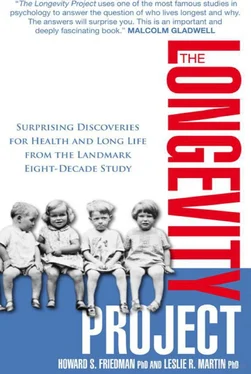Philip and Arlene separated shortly after he returned from the Pacific, then reunited, then separated again. He felt that she “no longer cared” and that his time away had created an emotional distance between them. They were divorced in 1947. Philip remarried less than one year later. A light to moderate drinker before the war, Philip’s alcohol use increased dramatically upon his return. Research studies have shown this to be generally true—men exposed to trauma or extreme stress are very likely to increase their drinking and, if available, their use of other drugs.
In 1950 Philip responded to a question about his use of liquor by remarking, “I am a fairly heavy drinker; I drink to excess rather frequently but do not feel that it has interfered seriously with my work or relationships with others.” He stated that he still enjoyed music and was a member of the Chamber of Commerce, the Army and Navy Club, and the Elks.
In 1955 Philip reported having high blood pressure, insomnia, and congestive heart disease. By 1960 he listed more health problems, including “slight heart trouble” and angina. He was still engaged with the Army and Navy Club but indicated that his leisure time included “less physical activity.” He also noted that his attempts to stop drinking had been unsuccessful. When asked what aspects of his life brought him the most satisfaction he listed his marriage as most important, and his children second.
Over the next decade Philip kept drinking, reported suffering from depression, and indicated that his heart disease was worsening. In 1972 he described his health as “fair” and said that he had to limit some of his activities due to low energy levels. He stated that his work was “tolerable” but said he would be glad to escape it when it was time to retire, which he believed would be in just a few years. He was looking forward to having time to “do more of the things [we] never had time to do.” As he anticipated his retirement, he wasn’t able to say that he expected to enjoy those years thoroughly; instead he said that he had “little idea what life will be like then.” Philip didn’t get a chance to find out. He died at age sixty-four from a massive heart attack.
Desk Jockeys vs. Infantrymen: The Effects of Stressful War Service
Over two hundred of the Terman men were sent overseas in the war, while about one hundred were stationed and remained in the United States. To study the long-term effects of service in the armed forces, we teamed up with the distinguished sociologist Glen Elder and his colleagues Scott Brown and Elizabeth Clipp. 91 91 For more about our core study on the Terman veterans, see G. H. Elder, E. C. Clipp, J. S. Brown, L. R. Martin, and H. S. Friedman, “The Life-Long Mortality Risks of World War II Experiences,” Research on Aging 31 (2009): 391-412.
The team’s research assistants, with knowledge of American military history, constructed records that documented the wartime experiences of each Terman study veteran.
After determining which of the servicemen went overseas, we analyzed whether they had faced combat. The combat experiences revealed in the records included being fired upon, witnessing death and destruction, and going missing or being taken prisoner. We also knew who had received Silver Stars and Purple Hearts.
We were not able, however, to ascertain the precise depth of combat each man faced. This means that our findings about the effects of war are underestimates, as some precision of measurement is missing. That is, things are probably even worse than what we found.
Looking at the risk of death during the half century following the end of the war, we discovered that the men who had served overseas were more than one and a half times as likely to die in any given year (after the war) than were those veterans who served only on the home front. That is, those who went overseas and survived their deployment were much more likely than their compatriots to become ill and pass away in the years after they returned home. Was it stress?
Where You Fight Your Battles
With Midway, the Marshall Islands, Peleliu, Iwo Jima, and more, the fighting in the Pacific was especially fierce, with sea battles, island warfare, and aircraft carrier-based air combat. So we zeroed in on fighting in this area. We asked whether duty in the Pacific theater of war—what Philip faced—produced different long-term consequences than did military service in Europe. Although the fight against the Nazis was certainly no picnic, the Pacific theater was especially brutal. Soldiers fighting in Asia faced tropical diseases, island-to-island fighting, distant cultures, and especially harsh enemy tactics.
In contrast to Philip, John spent three years doing intelligence work in England. Although his contribution was crucial to the war effort, and it entailed a good deal of stress, he didn’t usually have to worry about his personal safety and he was able to maintain regular contact with his parents and siblings back in Palo Alto, California. Late in the war, he knew about and had to come to terms with Nazi atrocities in the concentration camps. Some of his associates landed at Normandy on D-day, but none of his close friends were killed in combat. He maintained ties with his wartime “buddies” after his return home, transitioning rather smoothly back into his civilian job and life.
In a series of statistical analyses, we found that those men like Philip who fought against the Japanese in the Pacific theater were much more likely to die during the ensuing five postwar decades than were those men like John who served elsewhere overseas. The theater of fighting made a difference.
When we looked at the postwar mortality risk for those men who were sent overseas and faced combat as compared to those who were sent overseas but did not face the stress of direct combat, a consistent picture began to emerge. The combat veterans were less likely to go on to live long lives. In a fascinating finding, each stress posed a distinct risk—serving overseas, serving in the Pacific, and facing combat. The more alien and disturbing the situation, the worse the later health.
Personality and Battle Roles: The Surprising Selection
As often happens in our Terman studies, an unanticipated twist appeared as we pored over the statistical analyses—a finding with ramifications even for those who will never put on a uniform. We had seen before that the lives and paths of the participants were much less random than they first appeared. Could this be true even for wartime experiences, which are so heavily shaped by the demands of the military? We knew that conscientiousness measured in childhood was highly relevant to a whole host of later-life health trajectories. Could it even be relevant to war?
Even we were surprised to discover that the more conscientious subjects, such as John, were less likely to be sent to the Pacific theater. That is, the more careless, vain, and impulsive a man had been as a child (like Philip), the more likely he was to wind up fighting the Japanese in very dangerous and stressful Pacific operations.
As a child, Philip was impetuous and full of energy. He had plenty of friends despite his bouts of moodiness and his attention-seeking behaviors. Throughout his life he seemed to have more health problems than the average Terman participant. Although none of these illnesses was particularly severe, every report mentioned physical ailments ranging from tonsillitis in childhood to an ulcer, fungus infection, and sinus problems in adulthood. Over the course of his adult life Philip’s financial status fluctuated; on more than one occasion he reported to Dr. Terman that he had money worries.
Although sometimes a meteorlike strike would come out of nowhere and smack down a Terman participant, it was more often the case that an accumulation of small decisions and reactions would lead to large and significant consequences. While we have no direct information about why the less conscientious, like Philip, were more likely to end up serving in the Pacific, this fascinating discovery, taken in context with our other findings, leads to interesting conjectures about paths to long life: those traveling dangerous byways often crashed, and it repeatedly goes well beyond bad luck.
Читать дальше











